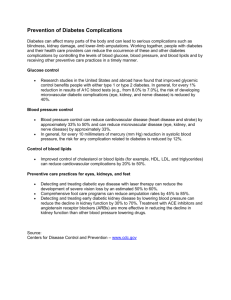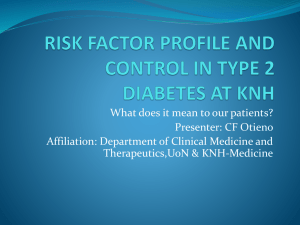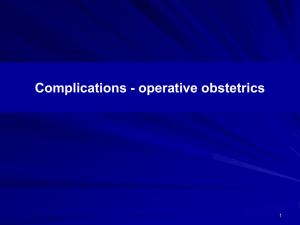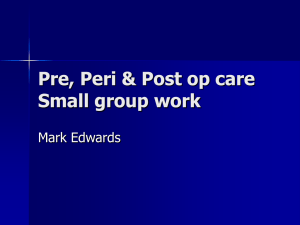Diabetes Matrix
advertisement
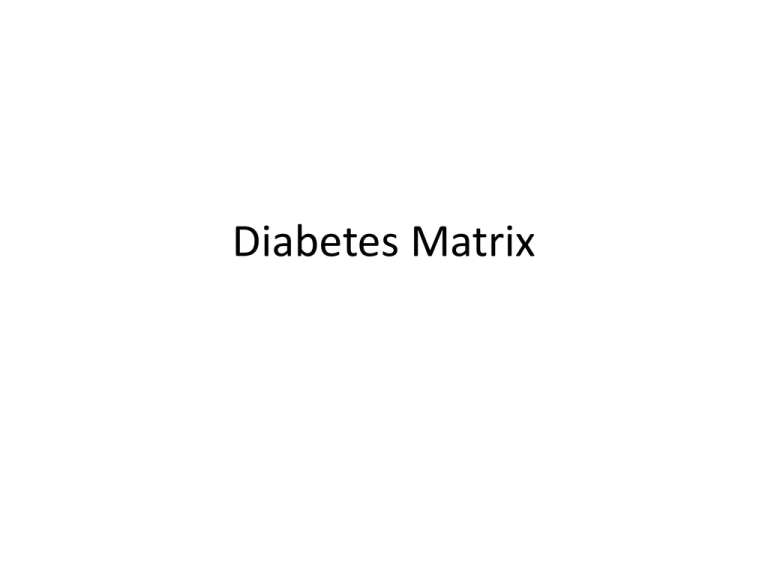
Diabetes Matrix Diabetes Matrix An Integrated Approach to Prevention and Care Diabetes Matrix Level 1: Community Prevention 2: Pre-Diabetic Screening Commi$$ioning! 3: Early Diagnosis 4: Forging Foundations 5: Rolling Review 6: Early Escalation 7: Curbing Complications 8: Avoidable Admissions 9: Unavoidable Admissions 10: Rationalised Long Term Care Commi££ioning Commi€€ioning Commi¥¥ioning Commi₤₤ioning! Diabetes Matrix An Integrated Approach to Prevention, Care and Commisioning Level Target Group 1: Community Prevention Entire Local Population 2: Pre-Diabetic Screening At risk groups within the local population 3: Early Diagnosis Pre-diabetic population, Known impaired glucose tolerance, newly diagnosed DM 4: Forging Foundations Newly diagnosed: excellent care from start focus on lifestyle, experience, outcomes, concordance, preventing complications 5: Rolling Review 5A: Well controlled with few risk factors to manage. Achieving high quality care parameters 5B: Complicated, higher risk or psychological or social issues affecting engagement with high quality care 6: Early Escalation Uncontrolled clinical and social factors at high risk of complications, admission or morbidity. eg hypertension, poor concordance, poor glycaemic control 7: Curbing Complications 7A: Patients with known complications/conditions: eg pregnancy, concurrent illness, planned surgery 7B: Patients with unpredictable complications: reaction s to medications, polypharmacy 8: Avoidable Admissions Hypoglycaemia, DKA, Foot ulceration and infection, 9: Unavoidable Admissions Patients with advanced disease and complications: acute coronary syndromes, stroke, amputation , nephropathy, neuropathy 10: Rationalised Long Term Care Patients with co-morbidities not amenable to treatment: end-stage renal disease, review of medications, end-of-life care Diabetes Matrix Level An Integrated Approach to Prevention and Care Target Group Recommendations 1: Community Prevention Entire Local Population GP , Local Authority, Employers, Community to promote healthy lifestyle choices: eg HEALTH Passport, Change 4 Life 2: Pre-Diabetic Screening At risk groups within the local population GP screening for at risk individualised: questionnaire, HbA1c%, GTT (dependant on group) 3: Early Diagnosis Pre-diabetic population, Known impaired glucose tolerance, newly diagnosed DM GP : monitors and manage those with IGT, IFG and newly-diagnosed diabetes 4: Forging Foundations Newly diagnosed: excellent care; lifestyle etc preventing complications GP: Individualised care-planning and excellent clinical care according to current best practice and NICE 5: Rolling Review 5A: Well controlled with few risk factors to manage. High quality care 5B: Complicated, higher risk , poorer quality care GP: “Year of care” or all main clinical needs embedded within an Annual Review: feet examination, eye examination, BP, Cholesterol profile, Urine Albumin etc 6: Early Escalation Uncontrolled clinical and social factors at high risk of complications, admission or morbidity: GP: Aggressive management of difficult to control risk factors, consider referral or seek advice. 7: Curbing Complications 7A: Patients with known complications/conditions: 7B: Patients with unpredictable complications: GP and Shared care: advice sought from best local advice, consider specialist referral 8: Avoidable Admissions Hypoglycaemia, DKA, Foot ulceration and infection, Specialist Acute Care with Diabetes input: “Think Glucose” management to reduce Length of Stay. Discharge to GP or Shared care to continue 9: Unavoidable Admissions Patients with advanced disease and complications: Specialist Acute Care with Diabetes input: “Think Glucose” management to reduce Length of Stay. Usually Shared care with GP/Specialist to continue 10: Rationalised Long Term Care Patients with co-morbidities not amenable to treatment: GP or Specialist or Both to rationalise care: review clinical targets, outcomes and medication. Co-ordinate care acceptable to
